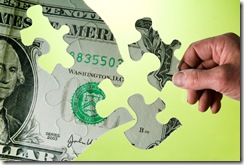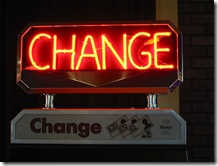This article really jumped out at me because my wife and I are currently house shopping. Dave Ramsey publishes a monthly newsletter and here was an article in the most recent edition:
Tempted to Buy the Big House
By Jon Acuff 
The television show, "International House Hunters," should actually be called, "30 Minutes of Television That Will Make You Hate Your Life." That's certainly a little longer than the original title, but I feel it's far more accurate.
The theme of the show is pretty simple. A couple looks at three homes in an exotic locale and then picks one to buy at the end. It's usually an attractive couple who tells this story:
"We're inexplicably wealthy and felt like we wanted to buy a house in Italy. We won't visit much, but will use it mostly as a place to store our shoes and go-carts. We both have jobs we can do remotely from Florence while we eat cheeses you can't pronounce, Jon Acuff."
They rarely use my full name to insult me in the show, but that's the gist. Having watched it for a few years, I've started to pick up on a common theme. I missed it at first, but now that I see it, it's so obvious.
In every episode, the couple is shown three homes. Prior to filming, they give the production staff a list of their needs. They specify how many bedrooms they want, how many square feet, where they would like it located and how much they can afford to spend.
Two of the three houses they are shown always meet that criteria.
But one house is always the "wild card." Sure, it may have a roof, but other than that, this house is nothing at all like the one the couple initially described they needed. If they specified two bedrooms, this one has five. If they asked for 2,000 square feet, this one has 4,000. If they said they wanted to be near the beach, this one is actually on the beach. And the kicker? This house is always at least $100,000 outside their price range.
Can you guess which of the three houses the couples tend to pick?
Can you guess which one of the houses "just stole our heart!"? If I put those houses in a police lineup, could you pick out which one closes the most deals?
You guessed it, the reach house. The stretch house. The "this is twice as much as we intended to buy, we'll have to sell plasma at blood donation centers," house.
It's amazing how elastic our budgets become when we go house shopping. Whether you're on a reality show or not, we all find ways to wiggle a little bit when it comes to picking out a home. And I'm just as guilty as anyone else.
As I write this, my wife and I are looking for a new home in Franklin, Tennessee. Over the last few weeks, we've really started to enjoy a new park. It's got soccer fields and playgrounds and miles upon miles of bike trails. There's even one portion where a friendly horse walks over from a local farm and will let you pet him while you pedal through the woods.
It's like Norman Rockwell meets Thomas Kinkade.
We love this park, so it makes perfect sense that my wife would say, "We should try to buy our house near here." That's not a bad idea, that's a great idea! Imagine riding our bikes directly to the park instead of jamming them in our car?
But even a great idea like that can warp your spending perspective.
My wife hasn't said as much and neither have I, but inside I can already feel a part of me thinking, "If we have to spend a little extra to be near that park, we will. Oh, we will." If I listen closely, I can already hear our budget expanding and stretching just a little bit at the very thought of having direct access to that park.
That's how it happens. You fall in love with an idea, or a detail or a view and bit by bit, all sense of reality starts to fade. Your price range, your budget, your ability to actually pay for that mortgage go right out the window.
Think of the sun-drenched trails through the woods.
Think of feeding apples to a horse in the middle of a fall day.
Think of the memories!
Think of the foreclosure procedure and losing your house because the bills washed over you like a tidal wave. That's less fun to think of, but at the end of the day, that horse isn't going to help me and my wife with our bills if we decide to live outside our limits.
I've never seen a couple on "International House Hunters" say, "We really liked the house right on the beach, but we just don't have the money for that. We decided to live below our means."
That's something I've never heard on TV, but I hope that the next time you go house shopping you'll be bold enough to find a house you love at a price you love just as much. Because it can be done and it should be done, and you'd be surprised how many horses live in affordable neighborhoods after all.


